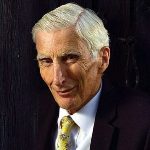Prof. Lord Martin J. Rees
 Prof. Lord Martin J. Rees |
Date & Time: 29th March 2021 : 04:00PM Title: From Mars to the Multiverse Abstract: Powerful instruments had led to astonishing progress in tracing the emergence of atoms, galaxies, stars and planets from a mysterious 'beginning' nearly 14 billion years ago. Unmanned spacecraft have visited the other planets of our Solar System (and some of their moons), beaming back pictures of varied and distinctive worlds. An exciting development in the last two decades has been the realisation that many other stars are orbited by retinues of planets – some resembling our Earth (and capable of harboring life). Looking further afield, observers can probe galaxies and the massive back holes at their centres and can check models of their evolution by detecting objects all the way back to an epoch only a billion years after the 'big bang'. Indeed we can trace pre-galactic history with some confidence back to a nanosecond after the 'big bang'. But the key parameters of our expanding universe – the expansion rate, the geometry and the content were established far earlier still, when the physics is still conjectural but is being constrained, especially by precision measurements of the microwave background. These advances pose new questions: What does the long-range future hold? Should we be surprised that the physical laws permitted the emergence of complexity? Are there other 'big bangs'? Biography: Martin Rees (Lord Rees of Ludlow, OM FRS) is an astrophysicist and cosmologist, and the UK's Astronomer Royal. He is based at Cambridge University where he has been Professor of Astronomy and Director of the Institute of Astronomy. He is a Fellow (and Former Master) of Trinity College. He is a former President of the Royal Society and a member of many foreign academies. His research interests include space exploration, high energy astrophysics, and cosmology. He is co-founder of the Centre for the Study of Existential Risks at Cambridge University (CSER), and has served on many bodies connected with education, space research, arms control and international collaboration in science. In addition to his research publications, he has written extensively for a general readership. His ten books include 'Just Six Numbers', 'Our Cosmic Habitat', 'Gravity's Fatal Attraction, and the recently -published, 'On the Future: Prospects for Humanity' . |
